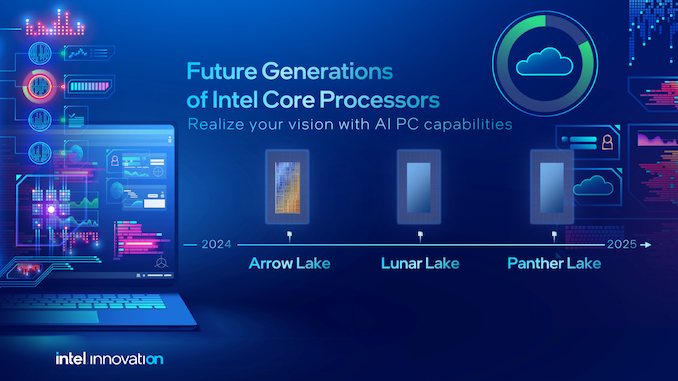Intel Announces Panther Lake Client Platform, Built on Intel 18A For 2025
by Gavin Bonshor on September 20, 2023 2:30 PM EST- Posted in
- CPUs
- Intel
- SoCs
- Intel 18A
- Intel Innovation 2023
- Panther Lake

While the primary focus has been on Intel's impending Meteor Lake SoC due by the end of the year, Intel CEO Pat Gelsinger unveiled more about their current client processor roadmap. Aside from a demo showing off a 'Lunar Lake' test box, Pat Gelsinger also announced Panther Lake, a new Intel client platform that is on track for a release sometime in 2025.
Intel's updated roadmap has given the industry a glimpse into what lies ahead. Following the much-anticipated Lunar Lake processors set for a 2024-2025 timeframe, Panther Lake is set to bring all the technological advancements of Intel's 18A node to the party.
As mentioned, Intel demoed Lunar Lake's AI capabilities with a live demo at Intel Innovation 2023. This included a pair of demos, one running an AI plugin called Riffusion within the Audacity software, which can generate music. The second was a demo running Stable Diffusion using a text-to-image generation model; it was a giraffe in a cowboy hat for reference. This was all done using a working Lunar Lake test box, which seamlessly looked to run the two demos with ease.
| Intel Client Processor Roadmap | ||||
| Name | P-Core uArch | E-Core uArch | Process Node (Compute Tile) |
Release Year |
| Meteor Lake | Redwood Cove | Crestmont | Intel 4 | 2023 (December) |
| Arrow Lake | Lion Cove? | Crestmont? | Intel 20A | 2024 |
| Lunar Lake | Lion Cove? | Skymont? | Intel 20A? | 2024? |
| Panther Lake | ? | ? | Intel 18A | 2025 |
Pivoting to the Panther Lake, Intel, via CEO Pat Gelsinger during Intel Innovation 2023, said that it's on track for release in 2025; we also know that Intel is sending it to fabs in Q1 of 2024. This means we're getting Meteor, Arrow, Lunar, and then Panther Lake (in that order) by the end of 2025. Panther Lake aims to build on Lunar Lake with all its tiles fabricated on the advanced 18A node. While (understandably) details are thin, we don't know what P-core or E-core architectures Panther Lake will use.
Intel's Innovation 2023 event was a starting point for Intel CEO Pat Gelsinger to elaborate on a comprehensive processor roadmap beyond the much anticipated Meteor Lake SoC, with the first Ultra SKU set to launch on December 14th; this about counts as a launch this year, barring any unexpected foibles. With Panther Lake on track for a 2025 release and set to go to fabs in Q1 of 2024, Intel's ambitious "5 nodes in 4 years" strategy is in full swing. While Lunar Lake paves the way with advanced on-chip AI capabilities on the 20A node, Panther Lake aims to build upon this foundation using the more advanced 18A node.
Although specific architectural details remain scant, the sequential release of Meteor, Arrow, Lunar, and Panther Lake by the end of 2025 underscores Intel's aggressive push to redefine the client processor landscape.










8 Comments
View All Comments
shabby - Wednesday, September 20, 2023 - link
Intel has ambition 😂 Replylemurbutton - Thursday, September 21, 2023 - link
The problem will always be that Intel has to use 5-10x the power just to match the efficiency of Apple Silicon. No matter what node they're using. It's the design philosophy that is the issue. Replydrwho9437 - Friday, September 22, 2023 - link
Well that isn't true at all...Thread director and efficiency cores are basically the same as why Apple silicon is efficient. When M1 came all the cores in Intel CPUs were high performance and the same. Apple as the advantage of tighter control of power management and the kernel that addresses their hardware than Intel.
If you just mean x86 decode that is a small overhead in fraction of a die at this point. That was a huge overhead for a 486 but there are orders of magnitude more transistors now.
I don't think Intel will win on power vs Apple because of the software aspect but the gap should close to maybe 10% or something. Reply
JayNor - Saturday, September 23, 2023 - link
Intel could gain a power advantage in Intel 20A vs TSM, since they are introducing both PowerVIA and GAA. TSM is behind on these. Replygoatfajitas - Friday, September 22, 2023 - link
Apple? Thats an ARM processor. Not the same thing at all. The problem with Intel lately is that they use 1.5-2x the power just to match the efficiency of AMD Silicon Replytipoo - Friday, September 22, 2023 - link
I'm very curious about Meteor Lake right now. If it delivers 50% better efficiency than raptor lake, it should bring the efficiency fight right back to AMD in slim laptops. Just doesn't scale up to desktop class yet, but laptops sell way more honestly.And then only spending one gen on Intel 4 before already moving onto 20a. Next few years will be very interesting for Intel. Reply
wanderer66 - Saturday, October 14, 2023 - link
Such predictive certainties always make for enjoyable reading. Please, do continue. Replytrivik12 - Thursday, September 21, 2023 - link
Any chance of asking Intel the question as to what node Lunar Lake is on. Its weird they mentioned 20A for Arrow Lake and 18A for Panther Lake but nothing about Lunar Lake. Its possible its on TSMC N3E which would be 1st for Intel has they have never used CPU manufactured outside(unless you can take N6 SOC tile e-cores ). Other question is whether its monolithic or tiles/chiplet based? Reply